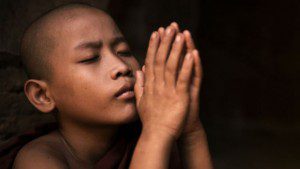 All the great traditions have at least one thing in common – the belief that “our” way is best. Such thinking is sometimes used to attack and repress those who follow other paths and in this way can be dangerous.
All the great traditions have at least one thing in common – the belief that “our” way is best. Such thinking is sometimes used to attack and repress those who follow other paths and in this way can be dangerous.
Buddhism is not immune from this as we can see in modern times in Sri Lanka and Burma. And perhaps in our own hearts.
Katagiri Roshi often observed with more than a touch of the ironic, “Under the beautiful flag of religion, we fight.”
What do you really believe in your heart? Is Buddhism best?
The issue is up for me today because of my work as the instructor/coach for the Vine of Obstacles: Online Support of Zen Training (click here for the most recent description). Our first course is “Guidelines for Studying the Way,” Dogen’s missive with ten cautions, beginning with the importance of arousing the Way Seeking Heart and then moving through other key topics like training for the sake of the truth and culminating with the importance of studying with a teacher and dropping body and mind.
The seventh guideline begins with this provocative sentence: “The buddhadharma is superior to any other teaching.”
If a student is going to get riled, this is often the place where it happens. Not nearly everyone gets charged, of course, and some students respond to this by saying simply, “Of course, it’s best. I agree.”
Others approach it more individually and relativistically, saying in effect, “Of course, I think it is the best way for me – otherwise, why would I undertake this training? I can’t really know if it is best for others or if other ways might after all be best for me.”
At least one student has worked it this way: “The buddhadharma is ‘superior’ in the sense that it is all inclusive. Because everything is included, at least it could be said that there can be nothing that is better.”
What is right?
Sorry to disappoint, but I don’t have a “right” answer to this one and my role in the course is to primarily to encourage reflection on the teaching and the practice that springs from such reflection. Not getting riled is not better than getting riled.
There is, however, an important aspect of studying the buddhadharma and Dogen that can become clear here – we don’t incite approaching this work as doctrinal. Dogen’s writing is not used as a source text for us to admire the great human then memorize his words and regurgitate them all over our friends and family.
Here’s a bit of how I frame Dogen study from the introduction to the Guidelines course:
Because the work is almost 800 years old, it is important to reflect on the timeless truths woven into the work (i.e., impermanence of self and other) and the cultural context in which Dogen lived (feudal Japan with a traditional power structure). I invite you to look for these elements in your study, using your body-mind as the laboratory for testing truth.
Dogen, in other words, could be way wrong. Even Buddha could be a bit wrong. And so too could each of us. The teaching is offered for us to take it up, examine it, and actualize it.
In this “the buddhadharma is superior” case, when Dogen refers to “other teaching,” he’s probably thinking about Confucianism, Taoism, and Shinto because he’d have had no exposure to Judaism, Islam or Christianity. But my sense of the passage is that if he’d known about these “other teachings” he’d have included them too.
Digging a bit deeper into this, I wonder if every path has strengths and weaknesses (like everything else in the human world). We then might ask, in what way is the buddhadharma best? What do we have to bring to the global spiritual conversation?
Well, the buddhadharma has one heck-of-a-philosophical framework, rigorously worked through for 2,50o years by the best and the brightest minds in Asia. Emptiness is hard to beat, after all.
And then there’s the path.
In this, I’ve benefited from a friend who is a minister in an evangelical Christian denomination. He speaks about the “born again” experience in such a way that I sense that the base experience might sometimes, at least, be what we in the Zen tradition calls “kensho.”
The evangelical Christian and Zen traditions have their own ways of contextualizing the before and after of break through, of course, variously likening it to the beginning of a personal and everlasting relationship with God or in Zen with expressions like “seeing true nature” and “beyond time and space.”
But it seems that we’re accessing the same root experience of going beyond our tiny large-brain-primate perspectives.
If so, what does the buddhadharma have to offer?
A few things come to mind. First, the koan tradition’s focused method for approaching break through. Second, the follow-up process for checking the experience carefully to discern if it is the real thing. And third, helping us put break through to work in our lives.
And then there’s the general practice in many traditions of the buddhadharma, of taking up a question, studying it with our body and heart, and as Rilke said, “loving the question itself.”
Is Buddhism best?











